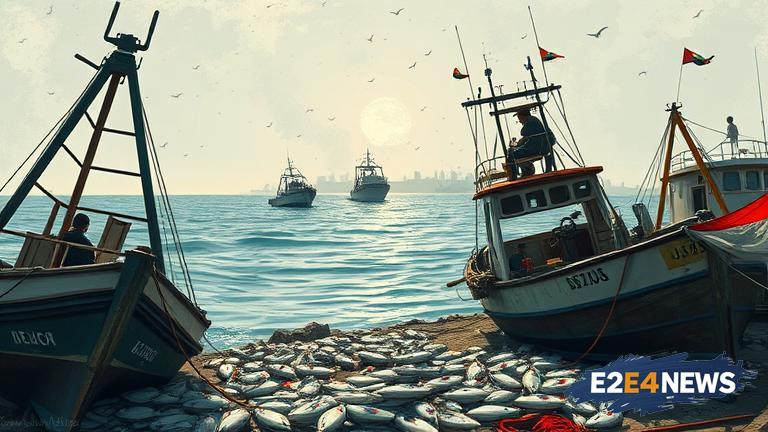The Gaza Strip’s fishing industry is facing an unprecedented crisis as Israel’s ban on fishing in the region takes a devastating toll on the local economy. For years, fishing has been a vital source of income and food for thousands of Gazans, but the Israeli ban has left many without a means of supporting themselves. The ban, which was imposed in 2007, prohibits fishing in the waters off the Gaza coast, citing security concerns. However, many argue that the ban is a form of collective punishment, targeting the entire population of Gaza. The effects of the ban are far-reaching, with many fishing families struggling to make ends meet. The industry, which once provided a livelihood for over 3,000 people, has been reduced to a mere fraction of its former size. Fishermen who once ventured out to sea to catch a variety of fish and seafood are now limited to fishing in a small area close to the shore. The catch is meager, and the fish are often of poor quality, making it difficult for fishermen to sell their catch. The ban has also had a significant impact on the local market, with the price of fish and seafood skyrocketing. Many Gazans can no longer afford to buy fish, a staple of the Palestinian diet. The situation is further exacerbated by the lack of alternative sources of income, as the Gaza Strip’s economy has been severely impacted by the Israeli blockade. The blockade, which has been in place since 2007, restricts the movement of people and goods, making it difficult for Gazans to access basic necessities. The fishing industry is not the only sector to be affected, as the blockade has also had a devastating impact on the construction, manufacturing, and agriculture sectors. The humanitarian situation in Gaza is dire, with over 50% of the population living below the poverty line. The fishing ban is just one of many restrictions imposed by Israel, which has been accused of violating international law. The international community has called for an end to the blockade and the lifting of the fishing ban, but so far, Israel has refused to comply. The situation in Gaza is a complex one, with many factors contributing to the crisis. However, one thing is clear: the fishing ban is having a disproportionate impact on the most vulnerable members of society. The elderly, women, and children are among those who are suffering the most, as they are often reliant on the fishing industry for their livelihood. The psychological toll of the ban should not be underestimated, as many fishermen are struggling to come to terms with the loss of their livelihood. The ban has also had a significant impact on the social fabric of Gaza, as families are forced to rely on handouts and aid to survive. The Gaza Strip’s fishing industry is not just an economic issue, but also a cultural one. Fishing has been a part of Palestinian culture for generations, and the ban is seen as an attack on the very identity of the Palestinian people. As the situation in Gaza continues to deteriorate, it is clear that something needs to be done to address the crisis. The international community must take action to pressure Israel to lift the fishing ban and end the blockade. Only then can the people of Gaza begin to rebuild their lives and their economy.
